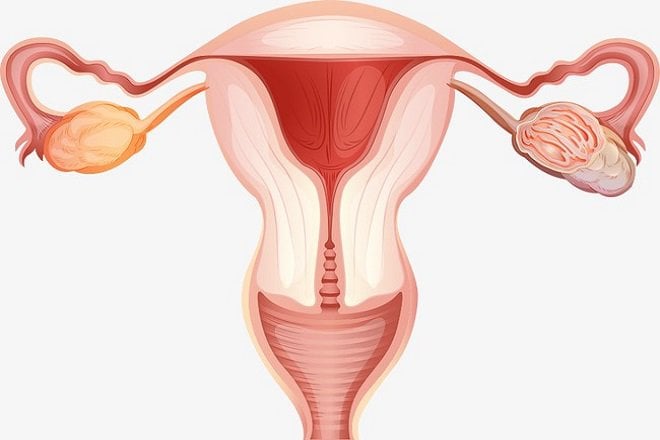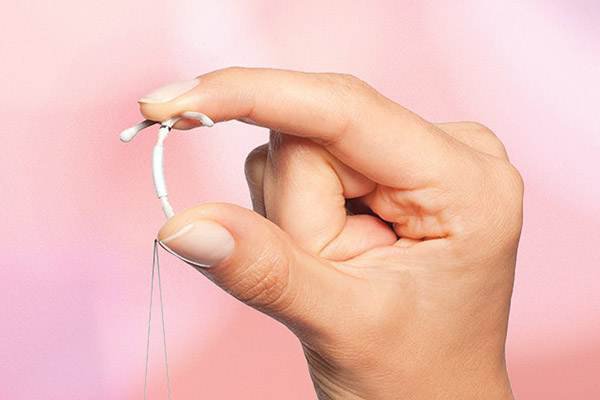Side effects of IUDs to prevent pregnancy
The IUD is an existing method of contraception that places a T-shaped device in the uterus to prevent implantation of the embryo. These methods are effective and have a success rate of up to 99%, however they also have some side effects. So what could these side effects be?
1. What is an IUD?
An intrauterine device (IUD) is a form of birth control that a doctor places inside your uterus (usually in a T-shaped shape) to prevent an embryo from implanting in your uterus.
Intrauterine devices (IUDs) are of two main types, copper IUDs and hormonal IUDs. For IUDs containing copper, there is protection from pregnancy for up to 10 years. While hormonal IUDs have a shelf life of 5 years.
Using a birth control device is a very effective method of contraception up to 99%. This is a quick procedure done in the clinic.
Nearly 4.5 million women in the United States use an intrauterine device (IUD) to prevent pregnancy. They are so effective at preventing pregnancy, that only one out of every 100 women who have an IUD become pregnant while using the device.
Intrauterine devices (IUDs) are of two main types, copper IUDs and hormonal IUDs. For IUDs containing copper, there is protection from pregnancy for up to 10 years. While hormonal IUDs have a shelf life of 5 years.
Using a birth control device is a very effective method of contraception up to 99%. This is a quick procedure done in the clinic.
Nearly 4.5 million women in the United States use an intrauterine device (IUD) to prevent pregnancy. They are so effective at preventing pregnancy, that only one out of every 100 women who have an IUD become pregnant while using the device.
2. Some side effects of IUD
Contraceptives are very safe. Some women may experience side effects, but they are usually mild. It's very rare for serious problems from using an IUD.
Side effects from this method of birth control may be different for each person. The effects you get will depend on the type of IUD you have and your medical history. There is no way to predict how your body will react to the IUD. If there are any problems, it's important to let your doctor know about them.
2.1. Abdominal cramps After the IUD is inserted, you may experience menstrual-like cramps for the first few days. Mild spasms are a normal symptom. Because the IUD is a foreign object to the body. When the IUD is inserted into the uterus, some women with sensitive uterine muscles will tend to contract to remove this foreign object. If the pain becomes severe, call your doctor for a full examination and instructions
Side effects from this method of birth control may be different for each person. The effects you get will depend on the type of IUD you have and your medical history. There is no way to predict how your body will react to the IUD. If there are any problems, it's important to let your doctor know about them.
2.1. Abdominal cramps After the IUD is inserted, you may experience menstrual-like cramps for the first few days. Mild spasms are a normal symptom. Because the IUD is a foreign object to the body. When the IUD is inserted into the uterus, some women with sensitive uterine muscles will tend to contract to remove this foreign object. If the pain becomes severe, call your doctor for a full examination and instructions

Sau khi đặt dụng cụ tử cung, bạn có thể bị co thắt vùng bụng giống như trong chu kỳ kinh nguyệt trong vài ngày đầu tiên
2.2. Fainting Some women feel dizzy or faint right after the doctor inserts the IUD. IUD insertion is an invasive, albeit minimally invasive, procedure for the body. When there is intrauterine contact, in some sensitive women, a reflex in the vagus nerve may cause a decrease in heart rate. So you may feel a little dizzy or, worse, faint. To prevent fainting, lie down until you feel better, then get up slowly.
2.3. Changes in your menstrual cycle Your menstrual cycle may change after you have an IUD inserted. Hormonal IUDs (Liletta, Kyleena, Mirena, and Skyla) often make periods lighter and shorter. Sometimes it's stopping menstruation altogether.
The copper IUD (ParaGard) can make your period heavier for the first few months. Some women experience bleeding or spotting between periods. Periods can usually return to normal within 6 months after you have the IUD inserted.
2.4. Ovarian cysts About 1 in 10 women will experience large fluid-filled cysts in their ovaries within the first year after the IUD is inserted. Cysts usually go away on their own within 3 months.
Most ovarian cysts are benign functional cysts and do not cause any symptoms. But some will cause bloating, swelling or lower abdominal pain. The pain can become sudden or intense if the cyst ruptures. If you notice these symptoms, talk to your doctor.
2.3. Changes in your menstrual cycle Your menstrual cycle may change after you have an IUD inserted. Hormonal IUDs (Liletta, Kyleena, Mirena, and Skyla) often make periods lighter and shorter. Sometimes it's stopping menstruation altogether.
The copper IUD (ParaGard) can make your period heavier for the first few months. Some women experience bleeding or spotting between periods. Periods can usually return to normal within 6 months after you have the IUD inserted.
2.4. Ovarian cysts About 1 in 10 women will experience large fluid-filled cysts in their ovaries within the first year after the IUD is inserted. Cysts usually go away on their own within 3 months.
Most ovarian cysts are benign functional cysts and do not cause any symptoms. But some will cause bloating, swelling or lower abdominal pain. The pain can become sudden or intense if the cyst ruptures. If you notice these symptoms, talk to your doctor.

Khoảng 1/10 phụ nữ sẽ gặp phải tình trạng xuất hiện những nang trứng to chứa đầy dịch trong buồng trứng của họ trong năm đầu tiên sau khi đặt vòng tránh thai
2.5. Pregnancy Use birth control to prevent a woman from becoming pregnant. Although the success rate of contraception is up to 99%, there is still a small percentage of patients who can become pregnant with the IUD. If this happens, it will be very dangerous, because it can:
Miscarriage Infection Preterm labor If you want to keep the pregnancy, you will have to remove the IUD. Removing the IUD also carries risks while you are pregnant. Ask your doctor about your options.
2.6. Ectopic pregnancy An ectopic pregnancy is when a fertilized egg implants outside your uterus. The fetus cannot survive and can be dangerous to health. Getting pregnant while having an IUD puts you at a slightly higher risk of an ectopic pregnancy. One in every 1,000 women has an IUD inserted each year. It's a little more likely if you've had an ectopic pregnancy, a pelvic infection, or a fallopian tube surgery. Tell your doctor right away if you experience abdominal pain or vaginal bleeding. This could be a sign of an ectopic pregnancy.
2.7. Infections The IUD slightly increases your chance of getting an infection of the uterus, fallopian tubes, or ovaries, called pelvic inflammatory disease (PID). The bacteria that cause PID can enter your body when the IUD is inserted.
You are more likely to get an infection in the first 20 days after the IUD is inserted, and having more than one sex partner also increases your risk of this side effect.
It is important to treat PID quickly to avoid serious problems. Tell your doctor if you have symptoms such as:
Abdominal pain Pain during sex Odorous discharge from the vagina Chills Fever Heavy bleeding Your doctor will prescribe antibiotics to treat PID.
2.8. Uterine perforation Very rarely, IUD insertion causes this side effect. You will need to have the IUD removed and need treatment if this happens.
Miscarriage Infection Preterm labor If you want to keep the pregnancy, you will have to remove the IUD. Removing the IUD also carries risks while you are pregnant. Ask your doctor about your options.
2.6. Ectopic pregnancy An ectopic pregnancy is when a fertilized egg implants outside your uterus. The fetus cannot survive and can be dangerous to health. Getting pregnant while having an IUD puts you at a slightly higher risk of an ectopic pregnancy. One in every 1,000 women has an IUD inserted each year. It's a little more likely if you've had an ectopic pregnancy, a pelvic infection, or a fallopian tube surgery. Tell your doctor right away if you experience abdominal pain or vaginal bleeding. This could be a sign of an ectopic pregnancy.
2.7. Infections The IUD slightly increases your chance of getting an infection of the uterus, fallopian tubes, or ovaries, called pelvic inflammatory disease (PID). The bacteria that cause PID can enter your body when the IUD is inserted.
You are more likely to get an infection in the first 20 days after the IUD is inserted, and having more than one sex partner also increases your risk of this side effect.
It is important to treat PID quickly to avoid serious problems. Tell your doctor if you have symptoms such as:
Abdominal pain Pain during sex Odorous discharge from the vagina Chills Fever Heavy bleeding Your doctor will prescribe antibiotics to treat PID.
2.8. Uterine perforation Very rarely, IUD insertion causes this side effect. You will need to have the IUD removed and need treatment if this happens.

Một biến chứng rất hiếm gặp khi đặt vòng tránh thai chính là thủng tử cung
2.9. IUD prolapse This is a condition when the IUD falls out of the uterus and usually occurs in about 3% of women. The risk is slightly higher in women who have been pregnant.
Trends cause symptoms like bleeding and pain, but some women don't have any symptoms. If you think your IUD has fallen out, don't try to put it back on yourself. See your doctor for advice and choose the right birth control method.
Intrauterine contraceptive device is currently a method of contraception applied by many women, because of the advantages of time, compactness, and high efficiency. However, in order to limit experiencing side effects or choose an unreasonable method of contraception, you should go to medical facilities to be examined by a doctor and have appropriate indications.
Specialist in Obstetrics and Gynecology - Vinmec International General Hospital is the address to receive and handle all problems from gynecological pathology, surgery to tumors, treatment of female endocrine disorders of all ages. age, taking contraceptive measures... prestige. Therefore, when there are any problems, customers can go directly to the hospital to be examined by a doctor and have appropriate indications.
The examination process at the hospital is always performed by a team of qualified doctors, combined with a system of advanced facilities to give customers peace of mind and the best choice.
Trends cause symptoms like bleeding and pain, but some women don't have any symptoms. If you think your IUD has fallen out, don't try to put it back on yourself. See your doctor for advice and choose the right birth control method.
Intrauterine contraceptive device is currently a method of contraception applied by many women, because of the advantages of time, compactness, and high efficiency. However, in order to limit experiencing side effects or choose an unreasonable method of contraception, you should go to medical facilities to be examined by a doctor and have appropriate indications.
Specialist in Obstetrics and Gynecology - Vinmec International General Hospital is the address to receive and handle all problems from gynecological pathology, surgery to tumors, treatment of female endocrine disorders of all ages. age, taking contraceptive measures... prestige. Therefore, when there are any problems, customers can go directly to the hospital to be examined by a doctor and have appropriate indications.
The examination process at the hospital is always performed by a team of qualified doctors, combined with a system of advanced facilities to give customers peace of mind and the best choice.
Để đặt lịch khám tại viện, Quý khách vui lòng bấm số HOTLINE hoặc đặt lịch trực tiếp TẠI ĐÂY. Tải và đặt lịch khám tự động trên ứng dụng MyVinmec để quản lý, theo dõi lịch và đặt hẹn mọi lúc mọi nơi ngay trên ứng dụng.
Reference source: webmd.com
Bài viết này được viết cho người đọc tại Sài Gòn, Hà Nội, Hồ Chí Minh, Phú Quốc, Nha Trang, Hạ Long, Hải Phòng, Đà Nẵng.






